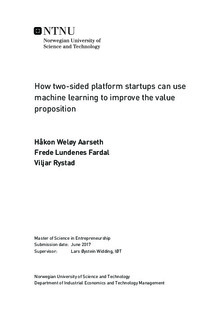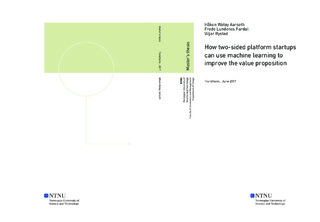| dc.description.abstract | The world's four biggest companies all have two-sided platforms and machine learning as central parts of their business. They leverage machine learning to improve the value proposition for the user, because the platform with the most satisfied users will win. This is also true for startup companies. However, dealing with machine learning is not easy. Manager of two-sided platform startups who tries this without the right tools or knowledge, will waste time and resources on the process. Therefore, the purpose of this study is to answer the two research questions:
How can managers of two-sided platform startups:
RQ1: Evaluate if the value proposition can be improved with machine learning?
RQ2: Determine the type of machine learning algorithms that could be applied?
A literature review by Rystad and Aarseth (2016) uncovered a gap in theory regarding improving the value proposition of two-sided platforms with machine learning. The literature offers little guidance to platform managers looking to answer such questions. To overcome this, a four-step conceptual framework based on the work of Han & Han (2001), Sandulli (2014) and Mitchell (1997; 2006) was developed, tested and revised.
A multiple case study with ten in-depth interviews was carried out to collect empirical data about the value proposition of five Norwegian two-sided platform startups: Graphiq, Tise, Learnlink, Nabobil and Leieting. The framework was applied on the collected data from the case studies. An analysis and discussion was then used to evaluate the framework. The analysis and discussion uncovered some parts of the framework that could be improved, resulting in a revised framework. These changes were related to more precise information, removal of unnecessary parts and rephrasing of questions.
The revised framework can help managers of two-sided platform startups with their most important job: creating more value for the user by improving the value proposition. This allow them to capture market shares and generate future profit. The paper is applicable for business leaders, business strategy scholars and entrepreneurs that want to learn more about how two-sided platforms startups can leverage machine learning to improve the value proposition. | |

